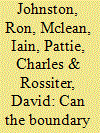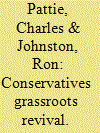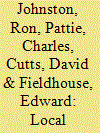|
|
|
Sort Order |
|
|
|
Items / Page
|
|
|
|
|
|
|
| Srl | Item |
| 1 |
ID:
162596


|
|
|
|
|
| Summary/Abstract |
Gerrymandering has long characterised the electoral cartography of the United States and a sequence of cases seeking to outlaw the practice have all failed before the Supreme Court. Its judgement in a 2006 case indicated that although the Court recognised the practice, it could identify no formal means of evaluating whether any particular map of Congressional or State electoral districts was a gerrymander that violated a constitutional provision. This encouraged those who drew up new district maps in many states after publication of the 2010 census data, most of which favoured the Republican party and were more egregious than previous such cartographies. A minority judgement in that case did suggest ways in which a gerrymander could be proved, however, and these were followed in a case brought regarding new State Assembly districts for Wisconsin. A lower court found in favour of the plaintiffs but this was over‐turned by a unanimous Supreme Court which found that the plaintiffs had no standing to challenge a state‐wide map. A concurrent decision by a minority of the Justices did suggest ways in which standing could be established and gerrymanders countered, and this may stimulate further cases—although it is uncertain whether a majority on the Court will accept such arguments. Meanwhile, America gerrymanders on.
|
|
|
|
|
|
|
|
|
|
|
|
|
|
|
|
| 2 |
ID:
092642


|
|
|
|
|
| Publication |
2009.
|
| Summary/Abstract |
As part of a strategy to remove perceived biases operating against it in the system used for elections to the House of Commons, the British Conservative party is promoting a revision of the rules used by the Boundary Commissions to ensure greater equality in constituency electorates. A Bill designed to achieve this-and also to reduce the size of the House-was introduced to the House of Lords in 2007. This paper critiques that Bill and suggests an alternative formulation that would better achieve the goal, whilst identifying a number of operational difficulties that its implementation would involve.
|
|
|
|
|
|
|
|
|
|
|
|
|
|
|
|
| 3 |
ID:
092364


|
|
|
|
|
| Publication |
2009.
|
| Summary/Abstract |
Healthy party grassroots constituency organisations play an important part in modern electoral campaigning, especially in marginal seats, and political parties try to concentrate their efforts on those closely contested constituencies. Recent evidence on party fund-raising at a local level shows that the Conservatives have taken considerable strides in supporting their campaign organisations in marginals, and have done so in a way which enhances their long-term campaigning potential there. The party's grassroots organisations are increasingly well-resourced, especially in the seats the Conservatives need to win back if they are to win the next General Election. However, while fund-raising suggests a healthy grassroots where it is needed, party membership data highlights continued problems for the party.
|
|
|
|
|
|
|
|
|
|
|
|
|
|
|
|
| 4 |
ID:
035920


|
|
|
|
|
| Publication |
London, Croom Helm, 1979.
|
| Description |
271p.
|
| Standard Number |
0856647403
|
|
|
|
|
|
|
|
|
|
|
|
Copies: C:1/I:0,R:0,Q:0
Circulation
| Accession# | Call# | Current Location | Status | Policy | Location |
| 021674 | 600/JOH 021674 | Main | On Shelf | General | |
|
|
|
|
| 5 |
ID:
122481


|
|
|
|
|
| Publication |
2013.
|
| Summary/Abstract |
From September 2012 most home undergraduates at English universities are being charged fees of £9,000 per annum. These are funded by a government loan, which attracts interest from the moment they start their course; after three years their accumulated debt exceeds £30,000. They can also borrow to cover their living costs, on the same terms, so that those studying in London can graduate with a debt of more than £50,000-although those from low-income families can obtain grants and universities are encouraged to provide bursaries and other support to students from underrepresented groups. Graduates start repaying their debts once their annual income exceeds £21,000-at a rate of 9% of the difference between their income and that figure: until the debt is fully repaid it continues to attract interest, by as much as three percentage points above the current inflation rate. Using data from a calculator on a government website, this paper shows that the highest-paid graduates pay back less than those on middle incomes: the 'squeezed middle' pays back more not only than those on low incomes but also the better-paid and those whose incomes increase more rapidly. This has differential effects according to occupation-and sex; and middle-income groups also contribute more to the costs of widening participation programmes, which all universities charging more than £6,000 per annum are required to fund.
|
|
|
|
|
|
|
|
|
|
|
|
|
|
|
|
| 6 |
ID:
149345


|
|
|
|
|
| Summary/Abstract |
There has been considerable debate regarding a hypothesis that the American electorate has become spatially more polarized over recent decades. Using a new method for measuring polarization, this paper evaluates that hypothesis regarding voting for the Democratic party’s presidential candidates at six elections since 1992, at three separate spatial scales. The findings are unambiguous: polarization has increased substantially across the country’s nine census divisions, across the 49 states within those divisions, and across the 3,077 counties within the states—with the most significant change at the finest of those three scales.
|
|
|
|
|
|
|
|
|
|
|
|
|
|
|
|
| 7 |
ID:
149240


|
|
|
|
|
| Summary/Abstract |
The distribution of voting rights in the UK is an artefact of history rather than a product of clear legal or philosophical principles. Consequently, some resident aliens (i.e. immigrants) have the right to vote in all UK elections; others can vote in local elections but are excluded from national elections; still others are excluded from all elections. In England and Wales alone, roughly 2.3 million immigrants are excluded from voting in national elections. This exclusion is inconsistent with the founding principle of democracy and distorts political discourse. What if all immigrants could vote in national elections? We estimate that up to ninety-five parliamentary seats could have been won by a different party in the 2015 general election. More substantially, enfranchising all immigrants would require re-drawing UK constituency boundaries. The new electoral map would increase the relative power of urban constituencies and would incentivise some political entrepreneurs and parties to temper anti-immigration rhetoric.
|
|
|
|
|
|
|
|
|
|
|
|
|
|
|
|
| 8 |
ID:
105864


|
|
|
|
|
| Publication |
2011.
|
| Summary/Abstract |
The regulation of party political funding and expenditure in the United Kingdom is an issue of continuing political and public debate. Campaign expenditure by candidates has been regulated since the late nineteenth century, but this has applied only during the short campaign period between the dissolution of Parliament and polling day. Concerns have been raised about earlier expenditure levels, but these were not regulated until legislation in 2009 which limits the amount that candidates can spend in the months prior to Parliament's dissolution-in 2010 this covered the period between 1 January and 15 April: the election was held on 6 May. The Electoral Commission has released information on all candidates who made a return of their expenditure during both periods. This article provides descriptive data on those amounts, by party and type of constituency, plus analyses which show that the more that a party spent the better its performance at the polls.
|
|
|
|
|
|
|
|
|
|
|
|
|
|
|
|
| 9 |
ID:
111656


|
|
|
|
|
| Publication |
2012.
|
| Summary/Abstract |
In February 2011 the UK Parliament passed an Act that both reduced the number of MPs to be elected to the House of Commons and significantly altered the rules for the definition of Parliamentary constituencies. After six redistributions in which organic criteria-MPs representing places with a community of interest-dominated the redrawing of constituency boundaries, the new rules gave precedence to an arithmetic criterion: all constituencies must have electorates within 5 per cent of the national quota (average). Seven months later the Boundary Commission published its initial proposals for a new set of 502 constituencies implementing these new rules. This paper evaluates the amount of change to the country's electoral map that this involves, identifies the main features of the new constituency configurations, and assesses their likely impact on UK political life.
|
|
|
|
|
|
|
|
|
|
|
|
|
|
|
|
| 10 |
ID:
153293


|
|
|
|
|
| Summary/Abstract |
Members of the British Labour party have, not for the first time, criticised the Boundary Commissions’ proposals for new constituency boundaries as gerrymandering. This represents a misuse of the term: the Commissions have produced recommended constituencies in the context of new rules for such redistributions that give precedence to equality of electorates across all seats and the boundaries of those constituencies have been defined without any reference to the likely electoral consequences. The Conservatives, who were responsible for the change in the rules to emphasise electoral equality, wanted to remove a decades-long Labour advantage in the translation of votes into seats because of variations in constituency size, and the Commissions’ implementation of those rules has achieved that. A Labour advantage has been removed but not replaced by a Conservative advantage: in terms of electoral equality between the two, the playing field has been levelled. Labour's claim to have been disadvantaged by decisions on the electoral register is also examined; the disadvantage is probably only small.
|
|
|
|
|
|
|
|
|
|
|
|
|
|
|
|
|
|
|
|
|